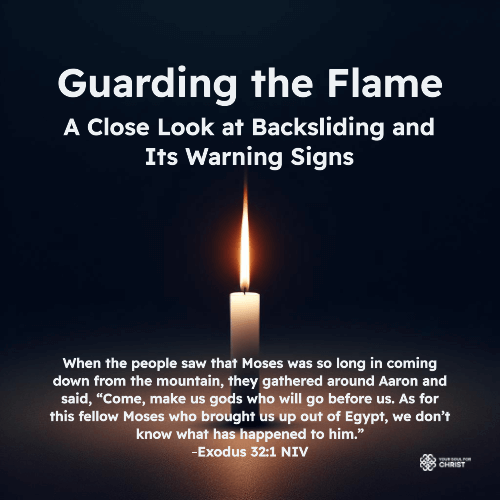When the people saw that Moses was so long in coming down from the mountain, they gathered around Aaron and said, “Come, make us gods who will go before us. As for this fellow Moses who brought us up out of Egypt, we don’t know what has happened to him.”
Exodus 32:1 NIV
In the quiet corners of our spiritual journey, there’s a sneaky path—one that, once taken, often leads to a slow and dangerous slide. This hidden journey is the slippery slope of backsliding. It involves a few seemingly harmless steps that, once taken, become a slippery slide into spiritual apathy. This post echoes this warning, revealing the risky dance with backsliding that the Israelites did when Moses was absent from the mountain for an extended time. As we unpack their missteps, let’s understand the subtleties of backsliding and learn enduring lessons that remind us to guard our spiritual zeal with vigilance.
When the people perceived that Moses was delayed in descending from the mountain, they approached Aaron, urging him to make a god to lead them. Their impatience marked the subtle descent into backsliding. Backsliders often find themselves on a slippery slope. Hence, it becomes difficult to retrace their steps without the guiding hand of Jesus.
The Israelites, though they had witnessed remarkable displays of God’s power, were not immune to the insidious allure of backsliding. From their deliverance in Egypt to the miraculous crossing of the Red Sea. Meanwhile, they had just witnessed the glory of God on mount Sinai and heard His voice. Despite pledging obedience to God’s commands through Moses, a shift occurred. Their heart condition, unveiled through their words and actions, revealed a troubling disposition.
How did they quickly become this corrupted, wanting an idol in the place of God? Their initial commitment, declaring, “We will do everything the Lord has said”, stood in stark contrast to their eventual fall. The first issue that led to their which I would us to consider was their rejection of God’s direct voice. They rejected the voice of God, opting for Moses, an ordinary man like themselves, to mediate.
When the people saw the thunder and lightning and heard the trumpet and saw the mountain in smoke, they trembled with fear. They stayed at a distance and said to Moses, “Speak to us yourself and we will listen. But do not have God speak to us or we will die.”
Exodus 20:18-19 NIV
As they beheld the thunder, lightning, and trumpet sounds at Mount Sinai, fear gripped them. Their withdrawal from God’s voice and subsequent plea for a human intermediary marked a pivotal moment. They did not think of God’s invitation into His presence as anything important, instead they rejected Him in fear. Their rejection of God’s voice then led them to withdraw some distance from His presence. “They stayed at a distance…” when they could have asked God for help so that they could bare to listen to His voice.
Rejecting godly counsel became the next stage of their regression. Not only did they distance themselves from God’s voice, but they also resisted counsel from Moses. This rejection of divine guidance caused them to drift further away. The biblical account emphasizes their remaining at a distance, yet the underlying current suggested a gradual slide away from God’s presence. It’s an important reminder that spiritual stagnation is not an option; without progress, regression becomes inevitable.
This narrative serves as a cautionary tale, urging self-reflection to prevent unconscious slippage away from God. Regular spiritual assessments are essential to identify any signs of drifting and take corrective measures. The scriptural exhortation to “test yourselves to make sure you are solid in the faith” underscores the proactive role believers must play in safeguarding their spiritual journey. As the Israelites learned, a momentary lapse in vigilance can lead to severe consequences.
Test yourselves to make sure you are solid in the faith. Don’t drift along taking everything for granted. Give yourselves regular checkups. You need firsthand evidence, not mere hearsay, that Jesus Christ is in you. Test it out. If you fail the test, do something about it.
2 Corinthians 13:5 MSG
In conclusion, this passage illuminates the perilous journey of backsliding, emphasizing the importance of remaining steadfast in faith and continually assessing one’s spiritual condition. The narrative invites us to examine our lives, ensuring we do not unknowingly drift away from God’s presence. Likewise, it underscores the need for vigilance, self-reflection, and reliance on divine intervention to navigate the spiritual terrain successfully.
